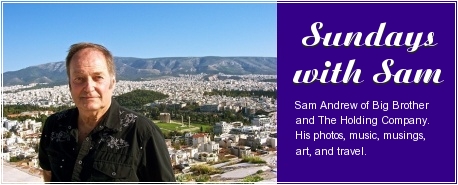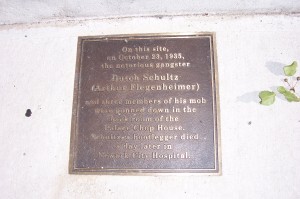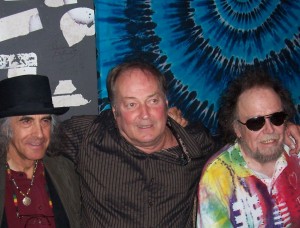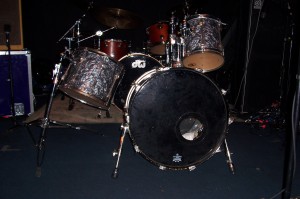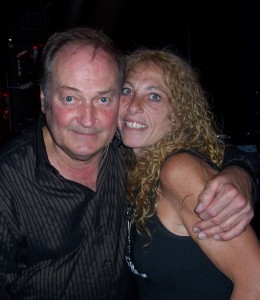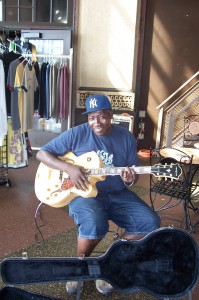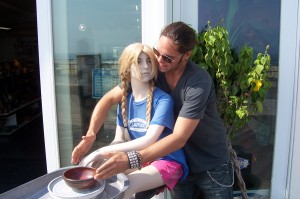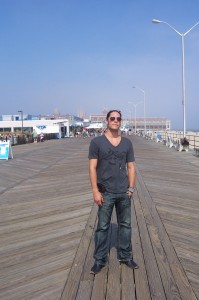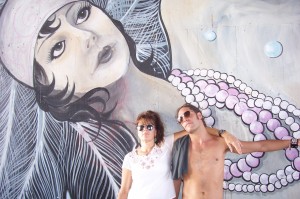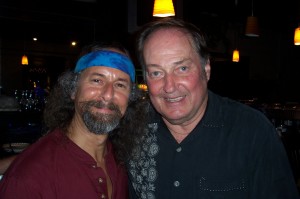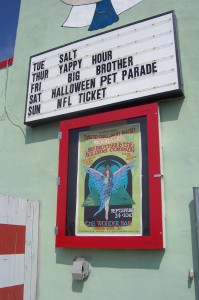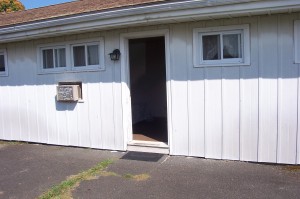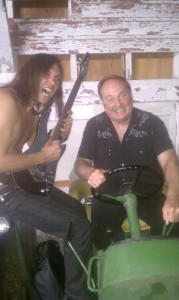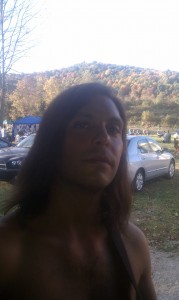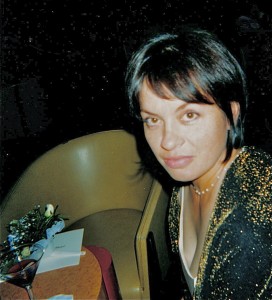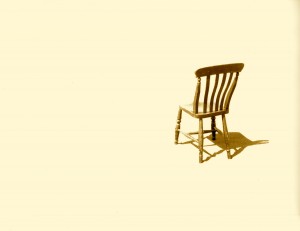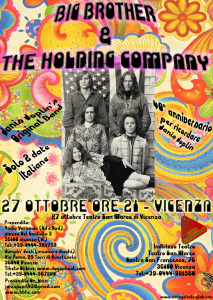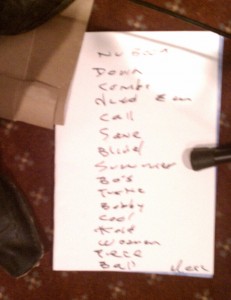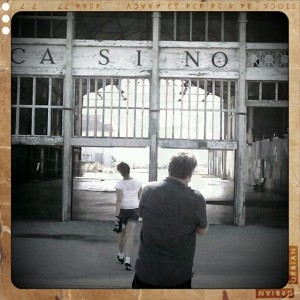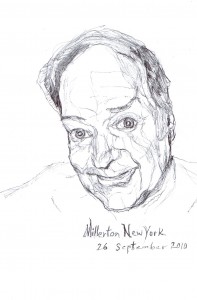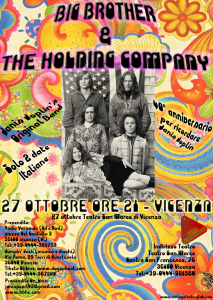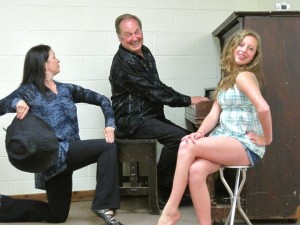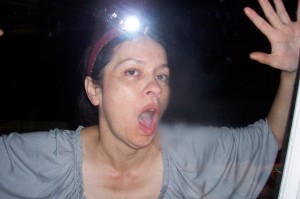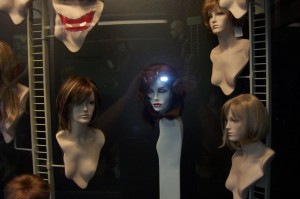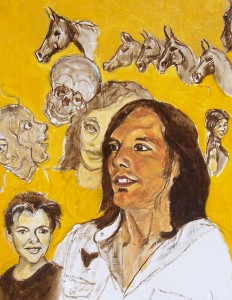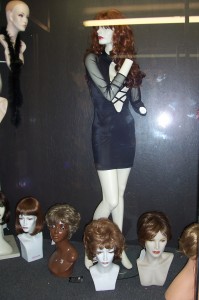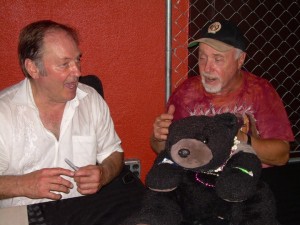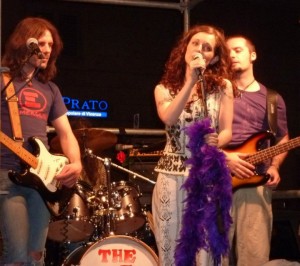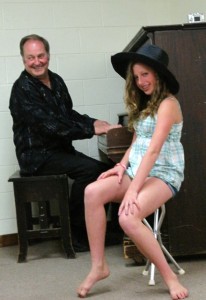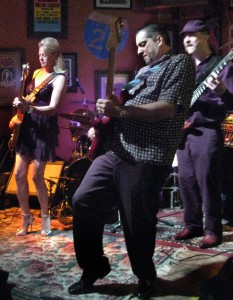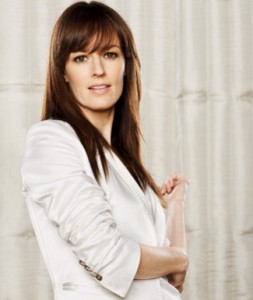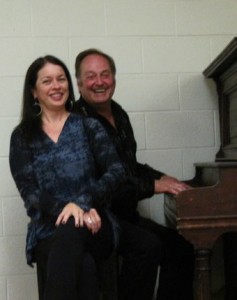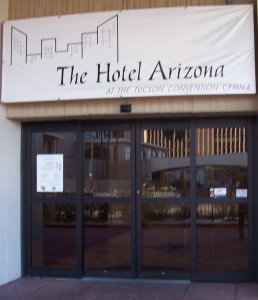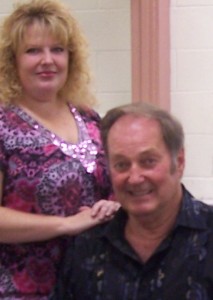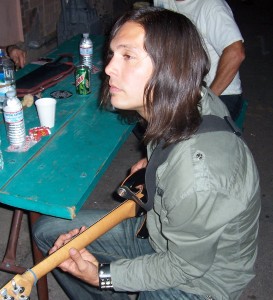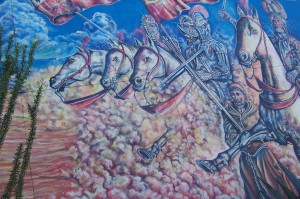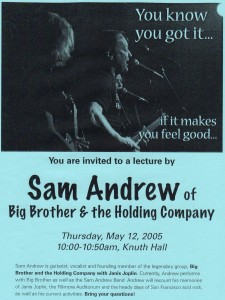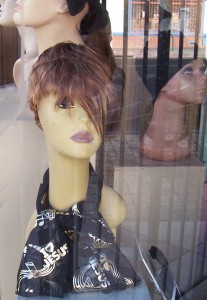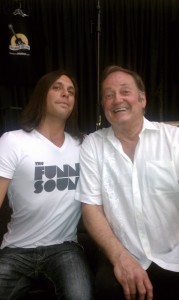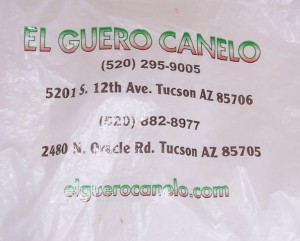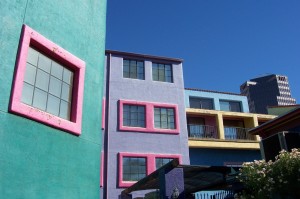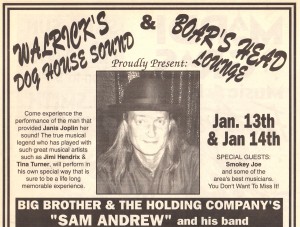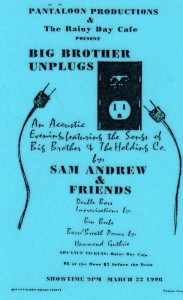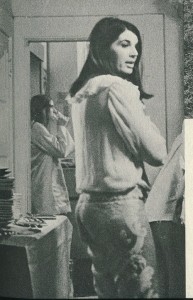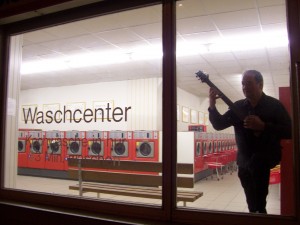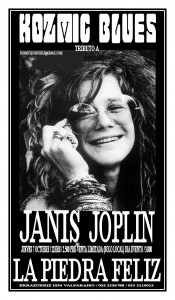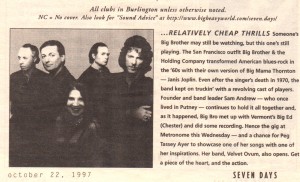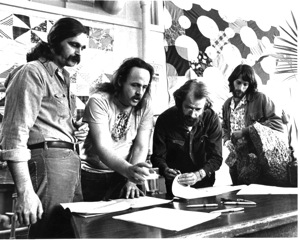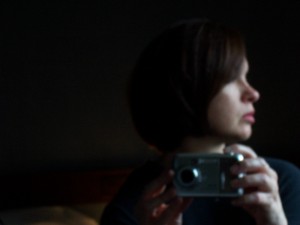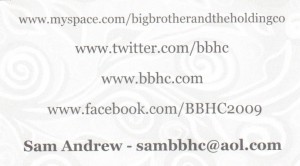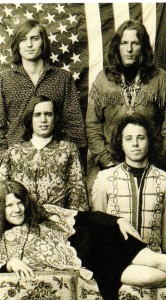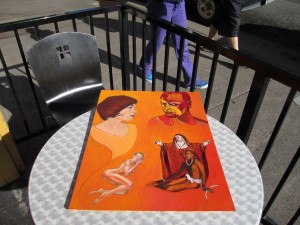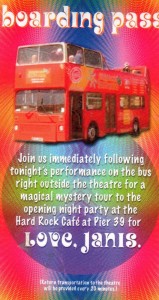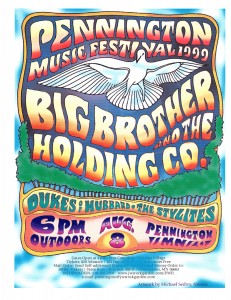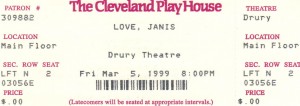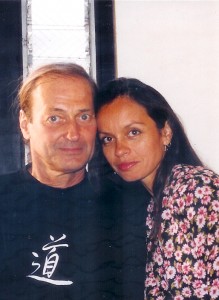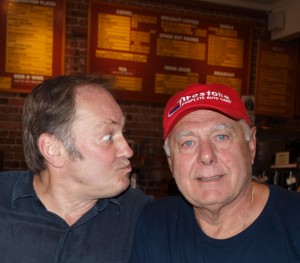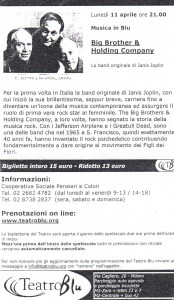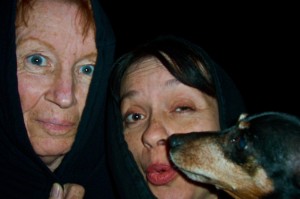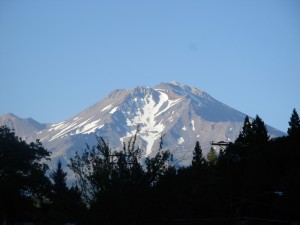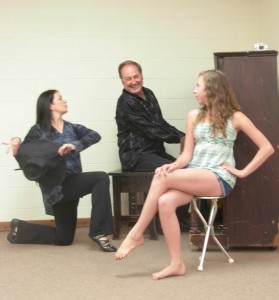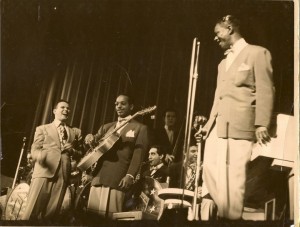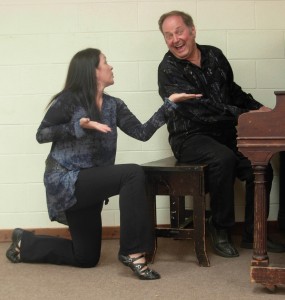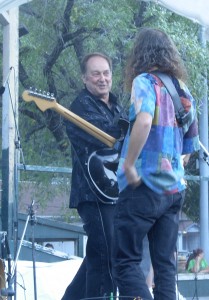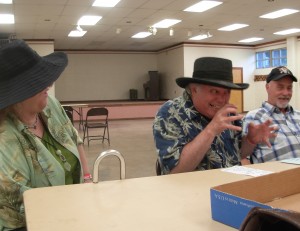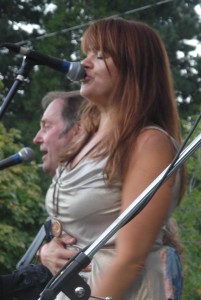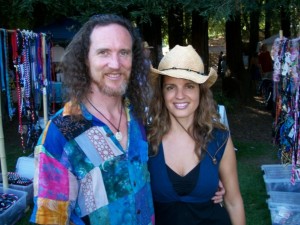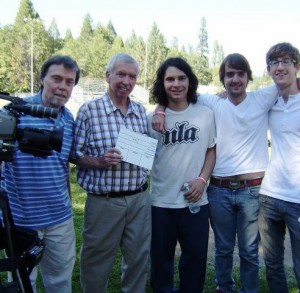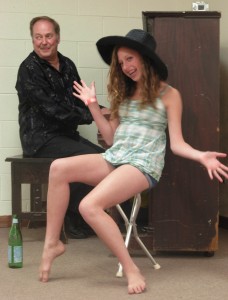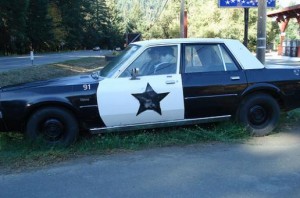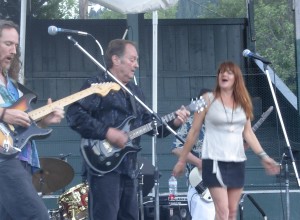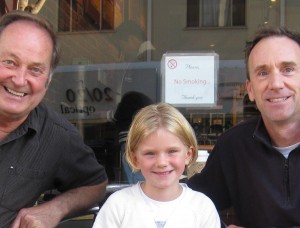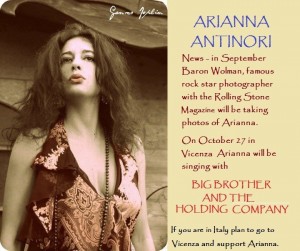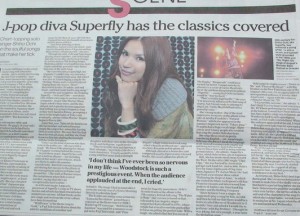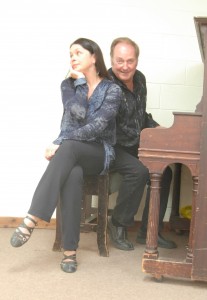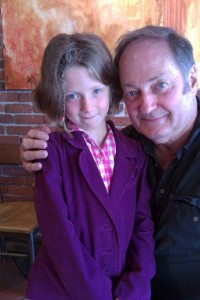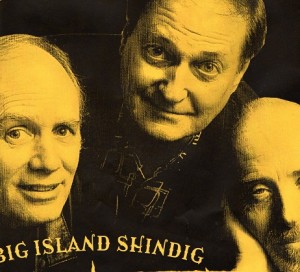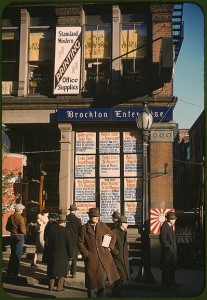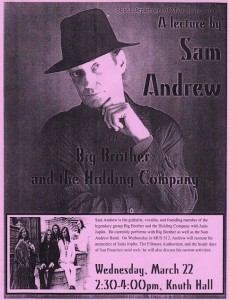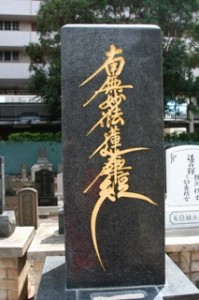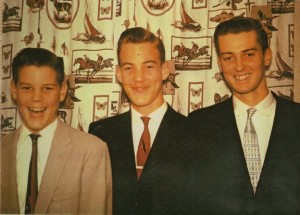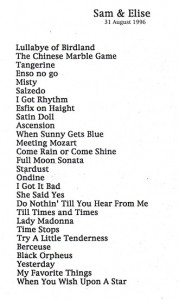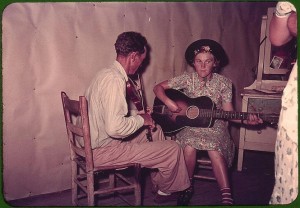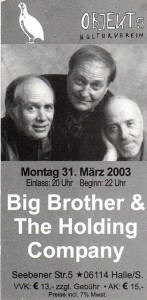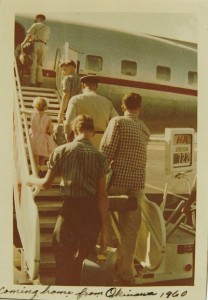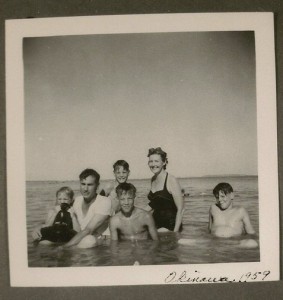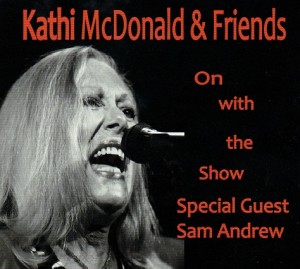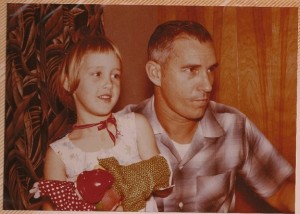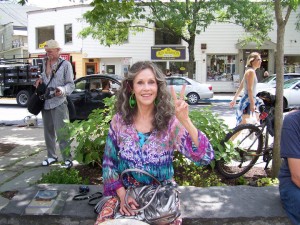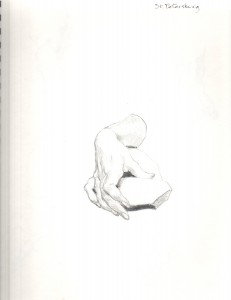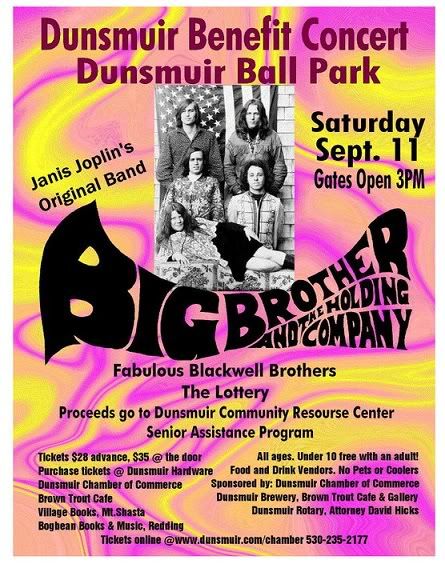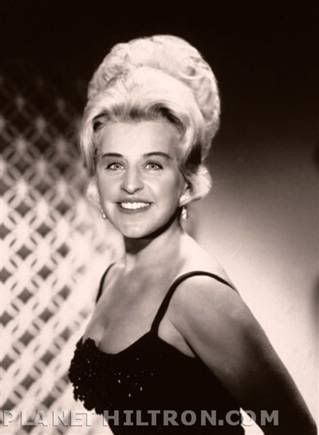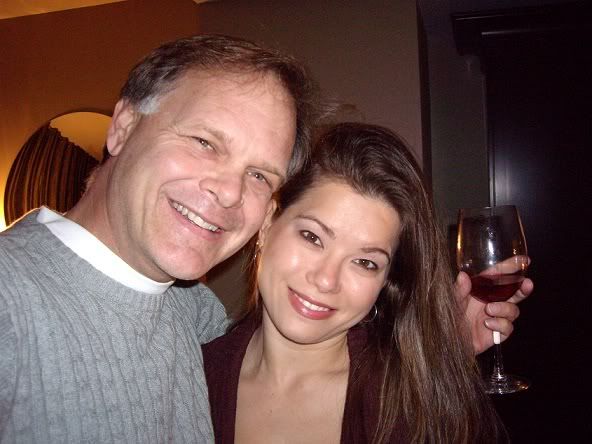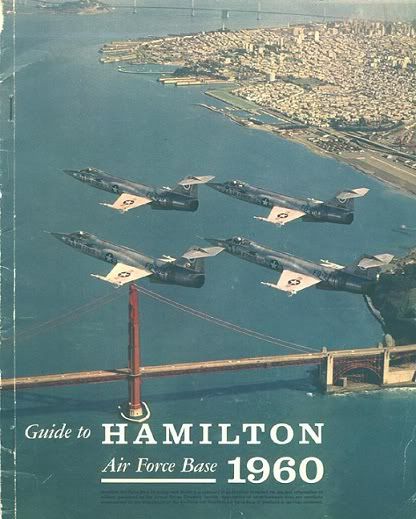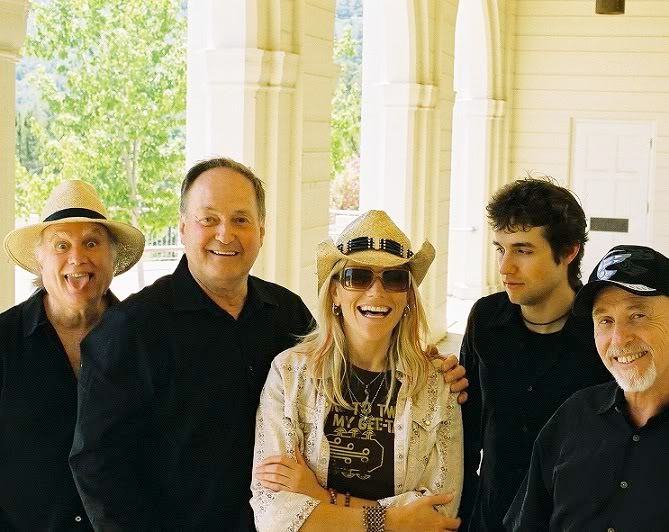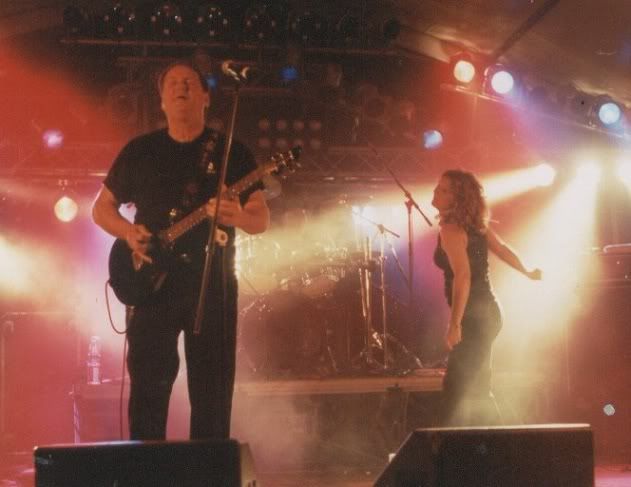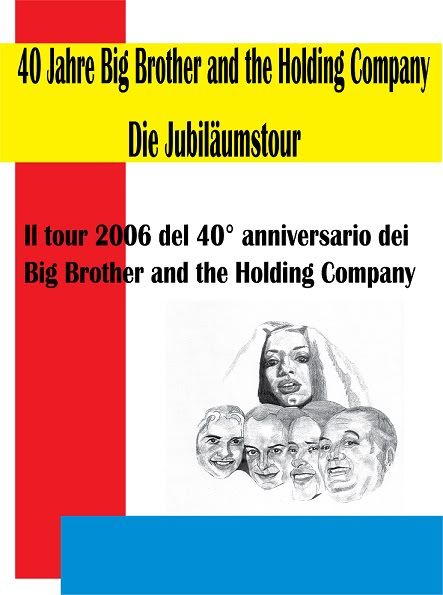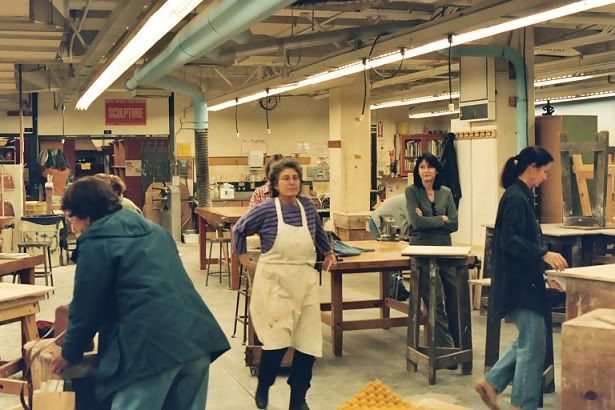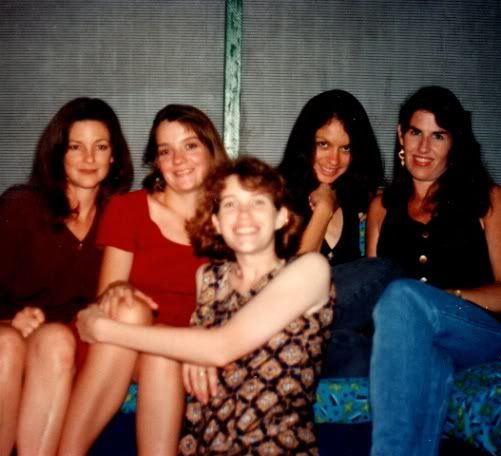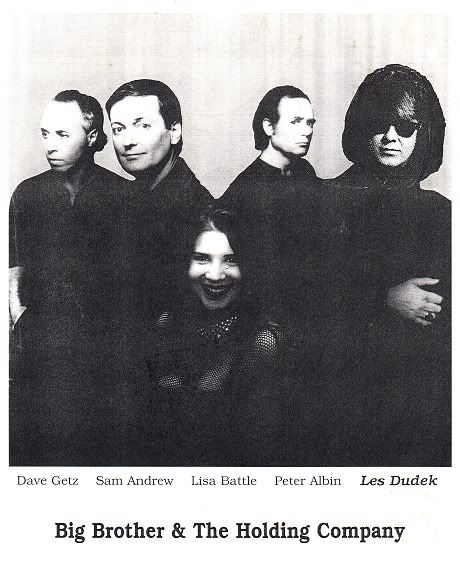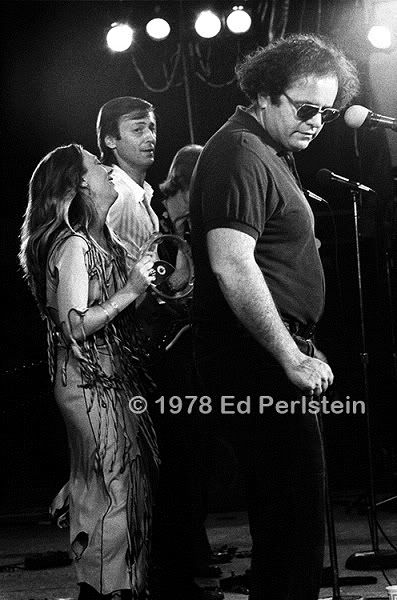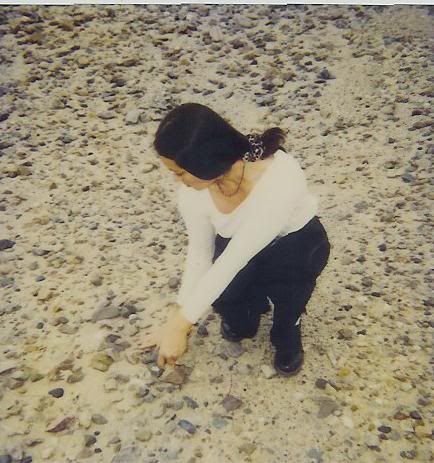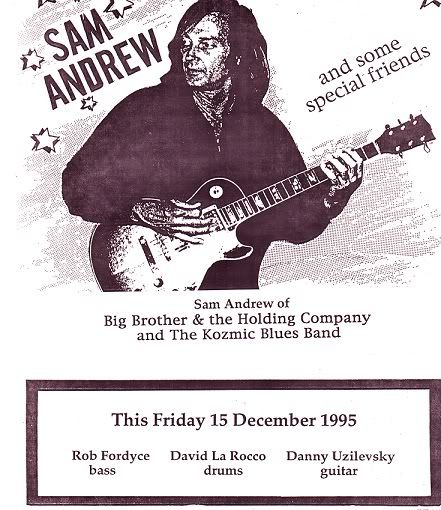I was able to catch up with Sam Andrew at his home in San Rafael, California. It was a hot July day when we sat down and talked. And talked we did. I should have called this a conversation with Sam. Yes I had done all my homework. I had read all the books, interviews, articles that I could find on Big Brother and the Holding Company. Sam had even photo copied some he had saved. Some of my Internet connections even e-mailed me with questions to ask Sam.
Nothing I had done prepared me for the interview, which follows. The reason is that once Sam and I started to talk, it was as though two old friends had gotten together. We needed to catch up with what has been happening. Sam is a gracious host and man with a great memory. I am glad that we covered as much ground as we did. We went beyond Sam’s Big Brother days with Janis, on into his solo years, only to return to Big Brother that we know them today. Make no mistake about the fact that Big Brother is back. With on going concert tours and a new CD, which just came out, titled “Do What You Love”, Sam is more active then ever.
I’d like to thank Sam Andrew, Chuck Flood, Ed Chester, Todd Bolton and the man who transcribed this interview Bill Delaney.
John Barthel
J = John
S = Sam
Part Two…Sam Andrew as interviewed by John Barthel
J. Yeah! I had read about that. Didn’t you end up at some friends of Janis’s…or relatives?
S. Yeah! Actually they were Peter’s. Peter has cousins all over the world…literally all over the world. We went to Moscow and we said, “You don’t have any cousins in this town”. He said, “Yes I do”. Then he called somebody up and a guy came down. It is just amazing he is related to everyone. But it was at his cousin’s house and those cousins… their name was Rush. There is a Doctor Benjamin Rush who signed the Declaration of Independence. He is a direct ancestor of theirs. He was a famous 18th century, maybe the most famous after Benjamin Franklin, scientist from that period. That family is brilliant. One of them Norman Rush writes stories and wins prizes. I read a novel of his…it was beautiful. They are really a talented family. Anyway…they lived in the suburbs of Chicago and the whole band went out there to stay with them…but not me. I stayed in town and slept on floors. That kind of thing. I really enjoyed it.
J. Well! I read…prior to going to Chicago that you had severed your relationship with Chet. He used to do managing work for you.
S. Yeah! Well he was the father of the band. People would always say, “Who is Big Brother?” It was Chet. He was really Big Brother. He was everything to us. He was running the Avalon, so he was real busy with that. But he was demanding a lot of us. We thought he was trying to tell us what to do too much. I think a lot of what he told us was right. We should have listened to him. But we fired him because….I think he may have told us not to get involved with these recording people and not to go to Chicago. I think in retrospect…everything he said was right. We should have listened to him.
J. So there you are in Chicago. Did you have any management in place?
S. No.
J. So how did you get tied into Mainstream?
S. Well! Went down to the Musicians Union…big mistake. There were all of these big Italian gentlemen in there. Like! In two tone suits, and every thing. Hanging around. A really classic scene…We said, “What can we do? This club is burning us.” They said, “We can’t help you. By the way where are your dues? Have you paid your dues? Are you all paid up? No we are not going to help you. So we went, “Oh man what are we gonna do’? So this guy, Bob Shad, who headed up Mainstream Records, said, “Come on in the studio. I will pay you a flat fee and you can make your money and go home that way.” We said, “Yea! That is great. What a deal. We get to record an album and make the money to go home with”. So that is how we recorded the Mainstream album. That one you have with the flowers on it.
J. What are your feelings on the album?
S. Well! I should take it in historical stages. At first I hated it a whole lot. We thought we were like…this heavy band, and this comes out. It is like really light playing, because the engineers kept telling us to turn down. I was totally intimidated by the studio. On stage you can get away with a lot. You can turn it up and it is exciting. It becomes Dionyssion and you have got this whole rebel thing going. But in the studio you have headphones on. You are not playing with everyone. It is just a totally artificial thing. You have to learn how to work within that. It is a different medium entirely. It would be way more than like switching from acrylics to oils….or something…It is probably more like switching from painting to Sculpture. It is just such a different medium. It is an entirely different thing and we were all intimidated by it. They put this out and we were just hated it. It sounded really weak and folk rocky. Not like what we knew we were going to become and we did become. That is what I thought at first. Now listening to this today. I am glad we recorded it, because it is like in this folk rock period in our career and it is really nice. It is nice to hear it that way.
J. Mainstream was known, I believe, for their jazz. Did that influence the sound of it?
S. Yeah, I am sure it did. Those engineers were used to recording guys who could come in and do it in one take. They were real musicians and they were in tune. They knew how to play and they would probably just start playing. They would say, “OK! Roll it,” and then they would play “Straight No Chaser”, or something. Then they would go, “OK! It’s a take. What are we going to do next?” We were trying to create this artifact in the studio. We did overdubs. We recorded Janis’s voice twice. She doubled herself. It was going to take long. It was the way albums were gonna be done in the future, but not how it had been done in the past. We were the first rock and roll band these guys had seen. So they didn’t know how to deal with it.
J. Some standout tracks in your opinion?
S. Well! I just like them all. Here is “Light Is Faster Than Sound” by Peter Albin. I wish we still did that tune. That was an early attempt to sound psychedelic with no synthesizers or anything. We would go “Light is faster than sou wow wow wow wound.” We would do it with our mouths to try to be psychedelic. “Call on Me” is one of the first songs I ever wrote. It is like this love ballad. It is still in the set list today. We played it last night. I love that song. I like the message. It is like… if you are in trouble give me a call. I like them all. “All Is Loneliness” we still do. We did that last night. It gets a big audience response. It is a funny song. I wouldn’t think anyone would respond to that song.
J. It is such a haunting song.
S. Yeah! It just sounds like nothing…kinda. It is just “all is loneliness here for me.” That is it. But because it is a round and it has that atmosphere, people really like it. They still like it. People will often say that is the one they like, out of the set.
J. I remember hearing it locally in the Bay Area. I grew up in Napa. They played that song and “Woman is Losers”.
S. Yeah! “Women is Losers”.
J. I thought they were such personal statements. It came across as something that. I don’t think about. Especially “Women is Losers”, coming from a tortured voice. That is what it sounded like to me. It is very personal. It came across, being a male, as something I don’t think about…from a female.
S. That early…that was really way ahead of it’s time…that song.
J. I know later Carly Simon had impressed me with some of her songs, written from a female point of view.
S. She was first. She was way out front on that and it was funny. It was a funny song. She could say what she wanted to say and kind of zing that message in there…and make you laugh at the same time. It was great.
J. So how long did it take you to record that?
S. It wasn’t long. It was a rush job. The whole thing was kinda on the cheap, low budget side. There is that feel to the whole thing. It was a thrill to be there though. A group came in. They were a black group. They were all children and I think it was the Jackson’s. The Jackson five but I am not sure. It was very fun to be in the studio. It was our first taste of it. I am glad it is there now. It later caused us a lot of trouble legally.
J. We can talk about that a little later…if you want. But that wasn’t released right away, was it? You went home to San Francisco and did you move back to Lagunitas?
S. I suppose so. Then shortly after that we moved back to the city. Out of Marin and back to the city.
J. And then…I am sure you have talked a lot about this…you participated in Monterey. It wasn’t too much longer after that?
S. It wasn’t. I guess that it wasn’t. I guess that is so. This was insulting. The way they did the business in this. Because…yeah! They didn’t release it. This isn’t really good enough. Why did we even record this? We spent money recording this record. Then we had to go and make it. We went to Monterey and made it and Columbia had to buy it from them for really a lot of money.
J. Buy your recording contract?
S. The masters. They bought the physical thing from Mainstream. I think it was two hundred and seventy five thousand dollars. Which now doesn’t sound like much…but then it was a lot of money. Then we
played a few gigs around the Bay Area. We moved to the city. And then before Monterey we rehearsed seriously for about a week down in the financial district. At a recording place which is now, like a attorneys place or something. Then we went down to Monterey and it was really something.
J. Any impressions of Monterey?
S. Well! They began before Monterey. It was one of those things that you knew… it was going to be something significant. One of the few things in life and it really was something significant. The week or so before we knew this is like a big deal. Something is going to happen here. This is going to be great. I had a close friend who had a Jimi Hendrix album. The first one…period…in San Francisco and it was so great! It was like, “Wow, who is this! He can really play”. We listened to the album over and over for the week before we got there and he played. How he played was astounding again as that album was in the first place. How much better he was than that album. That was really something. That alone was a very significant thing. The big story on Monterey was…there were all those people from Los Angeles who were really professional. They are really slick and they have got a lot of money and they know what is going on. They know everything about show business, like John Phillips with the Mama’s and Papa’s and Lou Adler. They know everything and, what are these people doing up in San Francisco? There is something going on up there…we keep hearing about it. “Maybe we should humor them and have this festival near to them and invite them down. We’ll be professional. We’ll show them what a professional event is. We’ll show them what is going on”. It was very much like that. They patronized the South towards the North. They came up and put on this festival. They said; “Oh! Here’s Big Brother. Well we’ll put them on in the daytime. When it doesn’t really count. But we…the Mama’s and Papa’s a gonna play at night when all the spotlights are on.” We went on and the other San Francisco bands went on and the Los Angeles people were just stunned…and astounded. They had no idea what we had been doing and then they saw it in front of them on stage. They saw they were going to have to change their whole thing. They were playing with these, kinda…little nursery songs and Janis totally astounded them. Then they asked us to play at night…a second time. We went on at night. That is when the band went national, world wide and stuff. It was a real watershed thing.
J. I read that Albert Grossman pretty much latched onto the group.
S. Well! We went to him. Our manager said; “Don’t sign this thing…to be in this film because they can exploit you.” It was good advice. This was a case where something is both right and wrong at the same time. He said; “Don’t sign to be in that film. The Grateful Dead are not going to sign…to be in that film. Moby Grape is not going to sign this. Those people are going to exploit you”. It was true. They did exploit us. However you have to trade off…and now you don’t think about the Dead or Moby Grape being at the Monterey. Why? Because they’re not in the film… You just don’t think about it. So we wanted to be in that film. We said; “Oh God, we got to be in that film. Hendrix is going to be in that film and Otis Redding is going to be in there”. Those are our two big heroes at Monterey… Jimi Hendrix and Otis Redding. “What are we gonna do? Julius (Karpen) is telling us no”. He is our manager. “Let’s go ask Albert Grossman. He knows everything. He manages Bob Dylan, Peter, Paul and Mary and Joan Baez. He knows”. We went to him and said; “Albert, what should we do”? He said; “You should be in the film, definitely”. So we signed it and were in there…and we have been exploited. Lou Adler has made all this money from Monterey. We played there for free. We never got anything… for it, but we got all this publicity for it.
J. They saw you there…and went out and bought the records later.
S. It is a trade off. There is no rule book to tell you what to do. There is no book out.
J. After Monterey…Albert helped you get a recording contract with Columbia?
S. He could tell we were real unhappy with our manager. He made the pitch to be our manager. That was the next step. He said, “Why don’t you let me manage you”? Then he got the contract with Columbia. That came as a matter of course.
J. So you had a big label record contract?
S. Yeah, bigger to us was being with Albert…seriously… because we knew he could put us on any label he wanted to. Once we got him we knew we had a label.
J. Yeah! He was responsible for Bob Dylan and many people too.
S. Yeah! And he guided their careers wisely. He had a lot of empathy with them… for a manager. He was real close to Janis. He took her under his wing. He spent time with us. We were really nervous about going with him, although we wanted to. We knew it was real significant. We said; “Well, were not going to sign with you unless you make us seventy five thousand dollars a year”. Later we thought… “Oh he is probably laughing inside”. He said; “If I can’t make you seventy five thousand dollars a year. You don’t even deserve to have me as a manager”. There was a lot of posturing and so we said; OK! We will put that in the contract”. Of course he made us that in like about a month…or something, but it was funny. But he said; “The only thing…I’ll sign with you, but I don’t want any heroin use in this band”. He said in New Yorker; “Smack. I don’t want anyone using smack in this band”. And we said; “OK! We won’t”. We were probably high at the time.
J. Had you been?
S. Yeah, I think so. Yeah! We had already been doing it, when he said not to. He was right of course.
J. Both you and James play lead guitar. Were you pretty even? Did you have any competition? Did you help each other grow as musicians?
S. Yeah! Equally as significant we both played rhythm guitar. You don’t think of it because lead is way out there, but James was a really good rhythm guitar player. He was responsible for a lot of the stability in the music, just the soundness of it. He would play real strong because he didn’t know anything else. He would play strong straight simple primary colors on the guitar, just block chords. He just played real conservative and it was like rock steady. I only knew that because we have been playing without him. We have had some great guitar players. Nobody is better than these guys. A lot of them have had trouble with the rhythm part. The lead part is OK. Everybody practices since they are fourteen on their lead, but people don’t practice rhythm. You have got to kind of have it or you don’t. So we have missed that a lot. But…Yeah! There was immense competition, but never admitted, because we were hippies and flower children…and you are not supposed to compete when you are hippies and flower children. Severely in competition all the time…I think it really helped the band. We never had fist fights and we never had words…”Hey! I want to play that! Give that to me”! We avoided that, but there was always intense competition between us. We were after two different things, which was lucky. He was after this progressive Dinonysian total feeling, no rules kind of thing. I am kind of trying to further this tradition and know the scales and know what they mean…and use that and kind of take off that way. Take that as a starting point and go away that way. So both approaches are valid and we each were real strong exponents of that way of playing. So that was good. That was good for the band.
J. You wrote quite a few songs for the band, but did James really do any? He helped write songs, but did he ever write songs or compose?
S. No! To write a song you have to be alone…lonely. You have to be lonely…and you have to be a self starter and do it away from the party… and be motivated and disciplined. And James isn’t really those things. He is just not made….Now! He is doing albums now by himself, but he wasn’t then. Him and David… both. I would write a song and call them up and say, “You complain because you don’t write songs, so I am going to come over to your house and we are going to write a song together”. Then I would go over and both to a whole….Like to Benny Goodman…all of the big band tradition , because they were horn players. We wrote a lot of songs, which at that time was very unusual. This is the late fifties. This is like 1957. We had a band and we played at teen clubs and we made a lot of money. We had a weekly television program on Okinawa. So those would be the two things. It would be like southern black blues, a real strong thing. Then these horn players coming from Chicago and exposing me to all that. So you have them in their own ways. David would kind of space out, but James would go to a music stores and look at equipment. That is his big thing, equipment. They would never respond to that. They would never write it on their own and they wouldn’t even write it if I would provide dinner. “OK! Here is a piece of paper. Here is a pencil. Now we are going to write this song.” It just never worked. They were just not interested in it.
J. What kind of guitar did you use back in those days?
S. I used several but for most of it I used a guitar called the SG Standard. It’s a Gibson guitar. It doesn’t go out of tune. It is real stable. It is a beautiful guitar. I am using a Les Paul now and it is small and kind of weighty, but the SG is bigger. It is like guitar sized. It is just a beautiful guitar. A nice tool.
J. I am surprised if you like it so much that you’re not using it.
S. Yeah! How about that?
J. You just don’t have one? Or do you have to search one out?
S. You know I am not. I could kind of play with anything. I could play with the cheapest guitar you know off the rack. It wouldn’t bother me. I don’t get like real attached to these things, like a lot of players do. I mean…I do, but I think you can play anything and really make it yours and make it work.
J. What did James use?
S. He used Gibbon’s too. We were the Gibson guys. Now he is using a Fender. Gibson and Fender are the two things. They are kind of like Cadillac and Ford, if you will, in the music world. The Fender is like a Ford, fast, nimble, kind of hot rod thing. The Gibson’s are like a Cadillac real solid rugged luxury item. They cost more money. He used a Les Paul Junior. I only found out in the last year, Chet got for him and gave it to him. Chet came to one of our performances and he said, “Hey! What about my guitar? When are you gong to give that back?” This was like, thirty years ago. I said to James, “Where did you get that guitar? Did you get it from Chet?” He said, “I don’t know. I don’t know where that came from.” That means yes, it did come from Chet.
J. Can we move on to Cheap Thrills? There is quite a history behind that. I had read there was a lot of problems. I guess John Simon?
S. Simon.
J. Yeah! He was assigned the task and that kind of fell apart. Some of it is studio and some is live.
S. That is the only trouble, with that whole New York thing, with Albert Grossman, is that he would kind of provide this package for us. Most of the time, by far, ninety five percent of the time it was really great that he did so, but this falls within the five percent. He shouldn’t have been the producer of this album. He helped the Band out, on their album. He was a keyboard player. He made these really nice records and all that, but he didn’t understand guitar stuff…at all, and that is what we were. We were like this guitar band. Maybe like “the” guitar band at that time. He just kind of thought we were crazy. I don’t thing he thought that much of Janis. He just didn’t get it. He didn’t get what we were doing. He would be more at home with, well…like the Band. Who are extremely good musicians…the music from Big Pink. He wanted to be in that band. They are like a string quartet and they are so good. Everything is in tune and it fits together. We weren’t that kind of Band. It was really messy and out of tune guitars going all over the place. Janis screaming and going over the top. I am sure he was going, “Oh my God, how did I get into this?” That is what we thought too. He was kind of mild mannered. He wasn’t right for the project, but that is OK. He did a good album after all.
J. Was it initially set out to be a mix of live and studio?
S. It was going to be totally live, but then it turned out we couldn’t play anything decently enough to go on the track. We had to go into the studio. It was pretty funny. We went to Detroit and played at the Grandee.
Ballroom. We brought the tapes back to New York and we all listened to them in Albert’s office. I came in and I said, “Does anyone have a joint? I just want to get high.” Albert went, “You don’t need to get high. You need to listen to this!” I went, “Oh shit.” I know it is going to sound like shit.
J. In trouble now, huh?
S. In trouble now and we were…Really they said, “Sam you shouldn’t play guitar. Peter you shouldn’t play bass. Sam you should be the bass player.” It was on and on. It was really serious heavy stuff. The moment of truth! In Albert’s office… So then we went into the studio and started recording in there. We kind of cobbled it together in there. It is a total artifact. It is not like this live album, like it is presented.
J. You mentioned the Grande Ballroom and you obviously played in New York, Fillmore East probably. Any thoughts on what was going on in San Francisco, as compared to other parts of the country?
S. It was pretty similar. We felt we were like the missionaries. You know like the Invasion of the Body Snatchers, like we had these genes and we were going to plant them everywhere. But they all had their own things. We just thought we evolved it in San Francisco first and in many ways that was true. But New York had a more political and intellectual overlay on it’s scene. That didn’t kinda work right, at that point in the sixties, which was extremely nonverbal. But we were ahead because we were nonverbal. We were ahead for a short while. We were hipper than anyone and then they all out raced us. Detroit had an extremely over the top scene. They had the White Panthers. Did you ever here of that? “White Is Beautiful” and MC5. They were over the top and really gonzo, insane and did a lot of crazy things. It was fun visiting these different scenes and see how they….
J. Did they receive you about the same, as in San Francisco?
S. Yeah! Detroit was…that was ecstatic, the reception. In New York it was too, actually.
J. Let me get back onto Cheap Thrills. Was there quite an anticipation for it’s release? A demanded timeline?
S. Yes! Because we played at Monterey and this was kind of result of that realization, or something. Yeah! This was an awaited album. Definitely.
J. How did it feel working for Columbia? As far as they put all that money out to get your contract.
S. Yeah that was great. It was like we graduated, you know? Went to their offices. The whole thing about going to New York, was great for us because we were like these kids from Haight Ashbury and we didn’t know anything. We got off the plane in New York and right away we were thrilled. We went to the Chelsea Hotel were Mark Twain and Eugene.
O’Neil and everybody had lived. We felt like, “Oh man, this is something!” We are becoming attached to this great tradition. Playing at the Fillmore East was great. It was no problem. We just took to it right away.
J. Any standout tracks for you?
S. Well, I liked them all. Every single one…Let’s see what would stand out? I liked “I Need A Man To Love”, a lot. That was fun. We wrote that really quick. Janis and I wrote it in about five minutes. It just came really fast. A lot of times the really good ones, just like in other places in art, the really good things will come really quick because they are the most natural. Naturally…”Summertime” was the most unusual arrangement of that tune that has been done by everyone, that has ever existed aside from Gershwin. So I think that was really something.
J. Do you like your “Combination of the 2”?
S. Yeah! It is just a rave up. A song is evolving in the band right now. A song called “Take Off.” It will become like a “Combination of the 2.” Those are just songs to get down and boogie by. There is no great meaning or anything like that. It is for the audience to have a really good time.
J. Now I am stretching my memory here. Forgive me if I mention the wrong singer. Janis was likened to…uh….
S. Bessie Smith?
J. Bessie Smith…exactly the name I was going to say (both laughing). I am not familiar with Bessie Smith’s work at all, but does it in your opinion have an influence?
S. Yeah! She was from the twenties and she sang with this really big wide-open voice. She was like a large black woman and because of the recording they had in those days, it sounded real trebly. She would really deliver this stuff. Really great, great singing! She was in a couple of movies and she had a tragic life but she sang She had a tragic end. That is what I should say. Janis had a tragic end. They both had great lives going to that end. She sang all over the place. When Janis early on, when she first came to sing with us, she sounded like Bessie Smith. She even imitated, practically almost imitated the scratches in the records. She even imitated the really treble thing, which probably wasn’t the way Bessie Smith really sounded, but because of the recording technology everything sounded real flat and treble. You know that sound. She would imitate that, so it was pretty funny. She could imitate a lot of singers, Janis could. She could sound like Joan Baez, you know, a real pretty show tune voice.
J. When you got a chance to sing, back in those few years, what were you striving for?
S. Well! My song writing…right in this “Combination of the 2”. I was striving for Motown. I was trying to sound like Marvin Gaye. It is no where near it. No where near it, but the chord changes….In that song I was thinking there is a tune by Marvin Gaye called “Ain’t That Peculiar”. In the main part of “Combination of the 2”, I just used the same two chords which are very common. Everybody used them. Marvin Gaye got them from somewhere else, but I was trying to go for this Motown thing and that will probably be astonishing to anyone who ever listens to that song. I don’t know if you have ever read this Beatles book…but they talk about each one of their songs. It is a really good book and they talk about what they were thinking when they wrote it. And in a lot of them, John Lennon was taking from Motown. You go, “What? It doesn’t seem anything like that. How could he possible get from Motown to that?” I think it is the same situation here, or they would be trying to imitate Buddy Holly. You know some song you would never think sounded anything like Buddy Holly…so it was just a start. I was starting off from Motown, Stax/Volt kind of thing. Never reaching it because those people, they could just sing, because we are some white kids fooling around.
J. This is quite a cover, almost super classic Crumb art work (holding the Cheap Thrills album).
S. Yeah, I am so glad we had him do it. This was the back originally and on the cover he had like a high school album. It had little pictures of us and it did. Speech 1 & 2, like that, for this cover and nobody liked the cover. But the back, this was the back of the album because you can see it is explaining everything and the credits and that. We said, “We liked this. We’re going to put this on the cover.” Crumb of course hates that he did this. He hates three things that he did in his life. He hates that he did “Cheap Thrills.” He hates that he did the “Keep On Truckin'” logo, which was stolen from him and he never got any Money. It’s on everything and one other thing. What is it? All three of those things are really the reason why he is known. It is like a typical dilemma.
J. Zap Comics or something like that?
S. Fritz the Cat! They made a horrible movie. It was a horrible movie. It really sucked…a terrible movie. He hates those three things.
J. I’ve got to ask you about this one here. Is there a hidden message here? Sam Andrew the 3rd. With all these blond women looking up at you.
S. That’s not a very hidden message. Crumb…he came and looked at us one evening. He took all of his notes for what he is going to do. James was real stoned. He was smoking a joint that night, so that was his way of putting him. He went over to Dave’s for dinner and Dave is a notorious space case. He probably just like…zoned out. Peter probably did this thing…He came and I happened to be with…I know these women today, Marlene and Vicki, and two or three other women. They were close friends of mine. They still are really close friends. I wasn’t sexual with any of them or anything. They were good friends, but they were all blond and really cute. They were like really attractive and dressed real well They were just hanging around. Crumb has got a notorious thing about women. A woman problem or something and he really glommed onto it. So that is why he put that on there, because they were all with me and we were having a good time.
J. I thought you were some kind of sex idol or something.
S. Uh! Well, I don’t know, but that is on the basis of the impression of one night.
J. Actually! I heard that Columbia was going to take a photo shoot, of you all in bed together in a hotel room.
S. Yeah! They did. They did it on the cover of Madison Avenue. In fact there is a Grateful Dead book, it is their personal photographs and that photograph is on one of their pages. We were all in bed there naked.
J. How did the Dead end up with it?
S. It is Jerrlyn, who used to be married to Mickey, and she ends up with everything. She is like a collector. Probably Peter gave it to her or James. She might have lifted it from James, or he might have given it to her.
J. I’ll have to search it out. I haven’t seen it. How come it was rejected?
S. We rejected it. We came there…it was so perfect. It was on Madison Avenue of course, literally on Madison Avenue, where the photo studio was. Dave and I came walking in there and they had the “Madison Avenue” of a hippie bedroom. It was like atrocious. It was all in pink with little frills and ruffles everywhere. We went, “Oh no, this isn’t what they want for the album cover?” Because none of us would ever step in a bedroom like that. All of our bedrooms were like black, with things hanging all over and candles. Kind of this dark…You were talking about that, like Gary Duncan’s (we talked about Duncan’s recording studio earlier…JB). That was it. That is what it was like. They had this really light…It looked like a Barbie Doll might sleep in it…or something. We trashed that bedroom. We tried as hard as we could to make it right but it didn’t work.
J. So the album sold really well didn’t it?
S. Yes! It was number one for many weeks.
J. Hells Angels logo is on the cover, is there something significant to that?
S. Well, they did security for a lot of our concerts. We knew Freewheelin’ Frank who was a very prominent one. We knew a lot of them. The San Francisco Chapter was a little different. I don’t know. I view that with mixed feelings. On my car, we got this car from Elise’s mother, it has a Harley Davidson sticker on it and even then I kind of wish it weren’t on it. I am not crazy about this idea. There were a lot of good people. I kind of came to know a lot of the Angles and a lot of them didn’t get a break in life. They had hard childhood’s and they went in the service and they were kind of stepped on there. They would become like mechanics or something. They were living kind of hard lives. They never had a chance. They were making something out of their hard lives and I appreciated that. There was actually something with some character and individuality. Instead of being crushed by the system or something. So I really appreciated that. But they were also people who were real sensitive and if you weren’t careful you could say something that would offend them and that would have dire results. Not like offending someone else, where you could talk about later. They would kill people. Literally kill them. People that we knew were murderers. I had real mixed feelings about them being on there (pointing at the cover…JB).
J. But it was number one and got you, I would assume, a lot more attention…and more doors opened?
S. Yeah! Our concert fees went way up. Although we never made those fees like you hear later, like ten thousand dollars would be really a lot to us for a concert… it still would be. But then right after us people started getting…,including Janis, astronomical sums for playing. But it was a number one record and then she left the band right in the middle of it.
J. You went on a European tour didn’t you…at least once with Janis?
S. Well…that is Kozmic Blues Band.
J. That ‘s Kozmic Blues Band?
S. Yeah, when she left this band.
J. So Big Brother never made it to Europe?
S. No! Nor to the Far East, or anywhere. I mean we went to Puerto Rico. That is about as far as we got. That is as far off shore as we got.
J. I guess it wasn’t much after “Cheap Thrills” was released that Janis left the band?
S. Yeah! Number one on the charts and she left the band. You just don’t do that. I mean…I wish I could have talked to her a little bit. We were all real confused. There was a lot of drug use about right there. It was a real confusing time.
J. There is one slam that I remember when it happened, there was a lot of talk that Big Brother wasn’t up to the standard. You know, up to the task of supporting her. I never thought that was the case.
S. Well, we launched her and it really worked in that period…just plain and simple. She should have stayed with the band at least six months, or a year more, if she was going to leave. She should have at least waited through this number one record period thing. But having said that, about that other point. In a large way it is true. She needed a band who were more in tune and could support her and all of that. She didn’t get it until Full Tilt Boogie Band. That was a good band, but Kozmic Blues Band was a mess. I understood what they were saying. It is probably why I went with her. I mean, I totally understood what they meant. I thought it was true as far as it goes, but that was not the whole truth. There was a whole bigger truth that they are not seeing at all because their critics. We were doing a lot of unusual….she was doing a lot of unusual things that she couldn’t have got to without Big Brother. She needed Big Brother to do that and I don’t think they have recognized that totally.
J. So you ended up going with her?
S. Yeah.
J. How did that come about?
S. Well…probably only because I understood her point of view and I understood she needed…she had asked the band. She said, “Can we have a keyboard player or some horns, at least on some of the songs?” I would always say yes and everyone else would say no. “No! You are going to change the Big Brother sound.” There is still a lot of that in the band today. Actually a lot of it left because…James was the one. The real sticking point and he would go, “No, no, it will change the sound.” And she may have been right. I don’t know. The point is she started feeling boxed in. We were doing the same songs…a lot. Three times a day sometimes and she just got impatient. She wanted to leave. This is just a musical explanation. She wanted to have like a big soul band. We weren’t going to let her, so she started feeling trapped. That is a bad thing for an artist to feel. That’s the musical thing. There is a financial part. Janis is a Capricorn, after all. We were splitting the money five equal ways. If she left, she could have all of the money and just pay the band as employees. I don’t know what ratio that would have been, but it certainly had something to do with it.
J. So was there a lot of hard feelings?
S. Yeah! But Big Brother was a gentleman’s band. It really was. People just didn’t express it. Other bands ended up killing each other, physically fighting. Like if that were in Moby Grape, what would have happened? Somebody would have been killed or something. But in Big Brother here, it was just undercurrent. Peter was the only one that spoke up. Complained about it. Everybody else was just….James will never say anything about anything. Dave was just kind of off somewhere, but there were very hard feelings and rightfully so. I think Janis and I should have stayed. I think she should have stayed and I think I should have stayed. It was a big mistake, a horrendous mistake.
J. Well you guys were almost like a family. You lived together and worked together and everything (a long pause followed before I resumed…JB). So what lead up to the formation of the Kozmic Blues Band?
S. She needed a band.
J. How did it get there…from Big Brother to there?
S. She wanted to be like Aretha Franklin, or Tina Turner, or something. She wanted to have a big band with keyboard, organ and horns in it. So that’s what we were going for. So Janis is going…This is one of her motifs, “I don’t know anything. I am so little…nobody cares about me. No one’s going to help me form a band. What am I going to do?” She was complaining to Albert Grossman and he says, “Listen I’ll get Nick Gravenieties and Micheal Bloomfield. They’ll come in and they’ll just put the band together.” She said, “Oh great! Ok!” They did. They hired everybody. We talked a lot about personnel choices and it kind of went back and forth for a few months. They got the bass player from the Paupers, which was kind of a well know Canadian band. He was really good. He was probably the best thing out of that whole thing…and a lot of different horn players. We started rehearsing in December, probably of 1969 or 1968. I don’t know dates back then. Mike Bloomfield kind of took it in hand. He was very supportive. I’d play something and he would say, “Oh man, you’re great! That really sings! That’s really great!” I had a good relationship with Michael. I was glad to get to know him.
J. Prior to this you didn’t know Michael or Nick?
S. I knew him, but not up close. We had never worked together.
J. And Gravenities?
S. Him I knew marginally better. Nick didn’t have that much….he kind of followed Michael around. He was real fast and brilliant and said a lot and talked all the time. He was manic. You would just have to kind of follow him around.
J. At this time weren’t they working together or was this right after Electric Flag?
S. They were in Electric Flag but I guess they would just take time off. They weren’t in the band. They would just come to rehearsals. Kind of steer it. That kind of thing.
J. I know they didn’t tour. Did they actually playing on any of the tracks?
S. Yeah, Michael played on the Kozmic Blues. Is it “One Good Man”? He didn’t credit himself. I don’t know why. I am listed as the guitar player on the album and then on this one cut it is obviously Michael Bloomfield playing, so I get questions about that every now and then by guitar players. They go, “Is that really you on that cut?” I say, “Naw, that is Michael Bloomfield.”
J. So you actually toured with Janis, in the Kozmic Blues Band?
S. Yeah! That is when we went to Europe. We went to all of the capitals of Europe and we played all over the United States. We had some really good nights but it never quite came together.
J. As far as the craftsmanship of the band?
S. No! We had some great musical nights but we just…It just wasn’t quite what Janis wanted. It was messy. The personnel was changing all the time. She was using too many drugs. I was using too many drugs.
The guys in the band were. After Big Brother, which was one family unit, it went to the opposite extreme. If it had gone to Full Tilt Boogie it would have been great, because there again…it was like five or six guys.
J. Were you playing larger halls, larger crowds?
S. Yeah! Way larger…
J. Did that have anything….possibly…?
S. Yeah! Probably. It probably did. We had a lot of pressure that way, but on the other hand we probably played really well to a lot of those crowds. In Europe we really played well. I thought that some of the best playing we did was over there.
J. There is a lot of tapes floating around with traders and some of them are from over there in Europe. Unfortunately not any of them…that I have heard, are of good quality.
S. On that Albert Hall tape, which is the night we played real well, Eric Clapton came up to me that night and said, “Man, you played really well tonight!” I believed him. I knew he was right because I had. It was one of those nights you get when everything is just perfect. But yeah! Every tape I have heard of that is real clouded over…bad quality. But I am amazed the stuff got taped. We didn’t know it. Nobody knew it was being taped. I am glad it was taped at all.
J. This is out of sequence, but you brought it up. A lot of stuff that was released after Janis had passed away. Live stuff…Farewell and something song?
S. Same Old Song.
J. Yeah! Janis in Concert and of course the Boxed Set had some stuff. So obviously somebody professionally….
S. We didn’t know about tapers then. They existed but we didn’t know it. They could have told me. I would have said, “Yeah man, tape all you want.” That is still what I say. I want this stuff to be around in twenty years.
J. That is one of the things I was going to ask you as a wrap up, but you have brought that up. What about your thoughts on bootlegs themselves?
S. Well! See to me it is fine. I know I am in the minority. A lot of people really dislike it and stuff, but it is like publicity. Todd has a thing going with bootlegs. Do you know about it? He and Dave are going to try to shortcut it. Which I think is a good idea. But it is not something I would do. I’m glad they are getting the word out.
J. So what happened? Getting back to Kozmic Blues Band, you said Janis wasn’t satisfied. What made it fold up and move on to Full Tilt Boogie?
S. It happened gradually. She just kept changing. Really! It kind of melted into Full Tilt Boogie, because the bass player with Full Tilt was in the Kozmic Blues Band. I think maybe three quarters of that band came out of Kozmic Blues, but Kozmic Blues just changed personnel the entire time, all the way throughout it’s history. We had a meeting in Los Angeles when we were recording. The band and I asked Albert, in front of everyone…which I think was a mistake. I said, “Give us some points on the album. Give the band some points on the album.” He said “No, you guys are paid employees…that’s it.” I said “Not even like one or two points? Can’t you let us feel like we are doing….?” The band themselves were trying to shut me up. They were saying, “Come on Sam we’re just doing it.” That’s when I saw the hand writing on the wall. I said, “Oh my God!” So shortly after that Janis called me to her room and fired me. She said, “Don’t you want to know why?” I said, “No!” Ever sense then I wish I would have said, “Yes, why are you doing that?” I had a few opinions why, but I think she was finally cutting….Really I think she only brought me along anyway, so she would have a piece of the old days, because it really wasn’t the right spot for me. I wasn’t the person to be doing that. There were fifty guys in New York alone, who could do better in what she needed to be done…in Kozmic Blues.
J. Where were you when this happened?
S. In Los Angeles.
J. Los Angeles?
S. Yeah! It was right after that, or soon after that meeting. I caused it…I embarrassed Albert. I should have asked him in private, about the band getting some points. Really, I was just like a fool through that whole thing. I should have just asked him. “Look what are you paying me? Pay me something. Don’t just act like I am another guy in the band. I came along doing all this stuff. I went out on the limb to do this…give me something.” But it’s just not were I was. I was really into the music. I was real focused on the music and trying to make that good. It’s OK! I just don’t think we should have left Big Brother. That was the big mistake. I don’t mind not asking for more money.
J. After you were out of the picture, what did you think of the following album, that they put out?
S. Of Kozmic Blues?
J. Of Full Tilt?
S. I thought they were a great band. I thought, “Wow! She had finally found it. This is what she wanted when she left Big Brother. This is what she was aiming for.”
J. But you actually took time and listened to it back in those days?
S. Yeah! This Kozmic Blues album came out after I left…really. That came out after I left. That was another one like Mainstream. I was so happy with that then. Now I think it is OK. It is all right.
J. I failed to bring that album along with me.
S. Well I can tell you on that. That is easy to say what stands out on that. This tune called “Little Girl Blue.” I think it is the best she ever sung. Right on! that very cut. I was playing guitar on it and I like the way that I sounded. You know I just re-recorded that the other day in New York, with another singer. It was great. It just didn’t make it for her…Kozmic Blues…the album just didn’t jell. But I thought the Full Tilt Boogie…when I heard that I said “Yeah! That was just the band she was looking for”…and it was. I think she would have gone on with that band and done great things if she wouldn’t have died. They were really good.
J. What were you doing when you heard of her death?
S. We had started up Big Brother again. We’d started up. I came back here. We met over at Dave’s house. OK! We were going to start again. Who was going to sing? Well Nick Gravenities can.
sing and Kathi McDonald. We were all at Dave’s house. The equipment manager, David Richards, called, or maybe John Cooke, and said Janis had died. She had OD’d. We all went over to Dave’s house and I guess we had what amounted to a little wake for her. Not much to say.
J. In retrospect after all these years, she had been held up almost like an icon, like with Jim Morrison and more recently Jerry Garcia. Do you have any thoughts on what our society, or what the music culture does to these people?
S. Well! I’ll tell you one thing. She was way more talented than Jerry Garcia or Jim Morrison. There’s no comparison. Tons more talent than either one of them. As far as an icon, I don’t know. If you are going to make a symbol out of anyone, it may as well be her. It is such an artificial thing anyway. I mean she was a human being. But she really could…truly sing. Now Jimi Hendrix… that is approaching Janis in talent. I think they both Jerry Garcia and Jim Morrison are not in the same league with those two at all. People will argue…
J. No comment…I could have mentioned a couple other artists.
S. Yeah! I don’t know you are leaning towards…? The culture making icons of one another? Especially Mohammed I would love to know.
J. You are fortunate enough to have met some many of these people…that aren’t with us any more.
S. Yeah! It was very lucky. Like a graduate course in Journalism and History. To really know these people, then later to read what has been written about them. It is very educational!
J. I’d like to get back to the time line…but while we are off the subject…I have heard they are making a movie about Janis.
S. Yes.
J. Is that right? Since I know very little about it can you share a little with us?
S. Sure I would be glad to. Originally there were three or four directors vying. Why this came up now? I don’t know. All of a sudden there is the Janis Joplin project and three or four directors are trying to do it. Here is one way it happened. Melissa Ethridge has this girlfriend, which the whole world knows, her name is Robin, I can’t remember her last name. She wrote a screenplay about Janis and Melissa read it and said, “This is great.” So she went and found Mark Rocco, a director in Los Angeles who has made some good films, and she said, “Would you consider doing this project?” He said “Yeah! I would love to. This looks great. Let’s go.” So that is one team. Then there is the woman who made Wayne’s World and a lot of silly movies like Beverly Hillbillies. Her name is Penelope Spheeris and she wanted to make a Janis Joplin movie. I don’t know if it had anything to do with Mark
Rocco’s project or what. But she came up and took us all to dinner and said, “Hey, we want to do this.” That was going to be with Disney. They dropped out entirely. They started talking about song rights and they dropped out entirely out of the picture. So now it is Mark Rocco. Clearing the rights to these songs is a nightmare. He said, “If I had it to do over again, I will never do anything like this again.” It has nothing to do with film making. You have to buy the rights to these songs. It cost a lot of money.
J. Well who owns the rights…Sony?
S. Yeah and we own “Cheap Thrills.” Our company published a lot of them, so they had to talk.
to us. There are about five holders of all these song rights. Jerry Ragovoy owns “Piece of My Heart.” The Mark Rocco, Melissa Ethridge team paid Jerry Ragovoy…just for the rights to song, not to own it. For the rights to use it in this movie. One million dollars. That is the highest ever paid in the history of cinema, for a song, one song… a million dollars. That’s that team. Then all of a sudden there is this team in New York. Nancy Saboka and her husband… and Francine Prose who is a feminist writer…A very good writer. They want to do a Janis Joplin film and they are with Sony Tri Star. Sony is the recording company, so right away that is like a big important connection. Also they have the blessing of Janis’s sister who owns a lot of the rights to everything. So these two are vying with each other on the East Coast and the West Coast. That went on for a long time…like maybe six months. Lots of late night phone calls, “Sam, will you do this? And will you do that? If I do this will you do that? If the money is there on Tuesday will you?” Mark Rocco would keep saying these things, but the money wasn’t straight. He was far away from his money. He would have to call Lakeshore, which I think was in Chicago. He… Mark, would say ” We’ll promise you this amount of money on Tuesday morning.” It would never happen over and over again. We kind of started getting nervous, you know? Even though we really liked him. I kind of liked what he wanted to do with the film maybe better than anyone else’s. But then here’s Nancy, in New York, everything she says she delivers. That is typical of men and women. Every single thing she says she is going to do, she does it and on time. We’ve met her. She is real intense. She grew up in the Bronx. She has this mission… to do this great film about Janis. She wanted Lili Taylor to act as Janis. Lili is a very good actor. I don’t know if you know Lili Taylor? She is in “I Shot Andy Warhol” and “Mystic Pizza” and many of other films…including a few of Nancy’s. So it just came to the point where we had to decide who to sign with and there’s Nancy. So we did it with her, but it was really hard because they are both going to be good.
J. When are the movies predicted to be released?
S. I’d say a year at least. Really! Mark Rocco has a screen play and everything in place. Nancy doesn’t. They are still writing it. It’s going to be a long time. It will be about a year. I don’t envy them. It is hard to do a story about anyone you know, like they were talking about a movie about Otis Redding. I thought…”How are they going to do that?” It is really hard to make a biography or something and be true with it.
J. They did Jim Morrison and the Doors. You remember when they did that?
S. Yeah!
J. Or the Buddy Holly story.
S. Or Vincent Van Gogh. Did you ever see that “Lust For Life?” Kirk Douglas plays Vincent Van Gogh. It has it’s moments but you know it is nothing like Vincent’s real life.
J. Why don’t we get back to 1969? Is that about right? In the midst of getting Big Brother back together. You mentioned Gravenities and Kathi McDonald. How did that come about?
S. That is a very good question? That was a very confused period. I don’t know why we thought we needed two singers. I don’t understand that. Maybe Nick was really pressuring us to go…and play with us…and stuff…because I would just have Kathi…definitely. We took them both out…Then we got a keyboard player. We finally got a keyboard player named Mike Finnegan and he could sing better than any of us. I mean he was a fabulous singer, unbelievable.
J. Nick had just got done working with Quicksilver on the Shady Grove album.
S. I wish he would have stayed with Quicksilver. I’ll tell you that.
J. He was with you for two albums…right?
S. Yeah!
J. Kathi…how did you get her?
S. Well! Her we got from me. I had met her. Coincidentally enough, you know those blondes on the cover of “Cheap Thrills?” In that same group…Kathi came into that same group and they were just like groupies, hangers on, but they had minds of their own. They were and are a group of smart women, but Kathi is a member of that little coterie. I met her and I guess wrote a song with her. I started playing some chords and I said “Try to sing over this.” She started singing and I was like…astonished. It was like the best singer I have ever heard. I said, “Wow!” So I brought her into the Big Brother band.
J. Janis…she lent her voice to a couple tracks on this album…didn’t she?
S. Yeah! On a song I wrote called “Mr. Natural Visits the City.” She is listed way down at the bottom. It is not even alphabetical order. It was Dave’s way of zinging her.
J. How did Columbia feel about this?
S. Do you mean about Janis coming back?
J. No! About you guys regrouping?
S. Well, we had a contract with them for a long time. This album sold…maybe like one hundred and fifteen thousand (holding up “Be A Brother album… JJB). So did the second one (How Hard It Is…JJB). So how they felt was, “I wonder if these guys will go away…or something…because they are not selling any records and we want to concentrate on Janis.” It’s probably how they felt.
J. You were a touring band also. I mean…you performed during this time period, right?
S. Oh yeah, all of the time. We played a lot.
J. And till about 72 you stayed together as Big Brother? Does that sound right?
S. A lot of times I would be the only one out…who was in Big Brother and the Holding Company. Many…many times. A lot of times it would be Peter and me. A lot of times it would be three of us. Sometimes all four of us would be there. But it just kind of dragged on and petered out.
J. On the first album without Janis and the second one, which I don’t have with me, I don’t know how good your memory is but…Any tracks or songs you love?
S. Well, I will have to say the same thing I have always said. I loved them all. We got it together. By now we could play and we were in tune. The whole tragedy of it was Janis left the band and we became musicians. This is like real music. We were really going for it.
J. You had that one track “I’ll Change Your Flat Tire Merle.” It kind of stands out in my mind.
S. Yeah! country tune. I liked all of these. I like the experimental ones a lot like “Home On The Strange.” We did on the one after this… “Promise Her Anything But Give Her Arpeggio.”
J. What is arpeggio?
S. Arpeggio is when you split up a chord. You can play a chord this way and all at once on a guitar, or you can play each note of a chord. When you play each note it is called an arpeggio? There was an advertising slogan: “Promise Her Anything But Give Her Arpeggio.” It’s a perfume. A goofy title…but That was kind of a Russian song, that was on the next album…but yeah, “I’ll Change Your Flat Tire Merle” was definitely a standout. I like them all on “Be A Brother.”
J. You have mentioned that sometimes it was just you? How did the band get in such a flux? Or turmoil?
S. Well! Turmoil yes…the money was low and that will always happen when there is not very much money. Just like my band The Sam Andrew Band…every time I play it is different personnel. We’re going to play Saturday. There is no one who is going to play, except me, who has ever been in it. It will be all new members playing the same songs. Which I love, but I have a high tolerance for that kind of stress. So with Big Brother we had the tunes, but people had to learn them.
J. So what caused the final door to close?
S. Good question, yeah, I would like to know when that final concert was. Heroin caused it to. I was doing a lot of heroin. Just a mess. Peter and Dave, they probably didn’t want to have much to do with it. They were scared. Something had happened on the road. There was a lot of cocaine in the band. The drummer had an ounce of cocaine in his hat. When we drove throughout the South, it all turned to liquid because it was so hot. That was funny. There was a lot of comic relief in the band. But it was just drugs. It just ran out and then I just said “The hell with it. I am moving to New York and learning how to be a musician and study this in school.” Which I did…I am glad I did it.
J. How long were you engaged in that?
S. That was through the seventies. That was from 71 to about 78 & 79. I lived in New York. That is the longest I ever lived in one spot.
J. What kind of music did you learn? When you said you learned music.
S. Well, I went to school and I learned harmony and counterpoint. I wrote a symphony and some string quartets. I really got into classical music.
J. At a private college?
S. It was at the New School for Social Research, which is kind of the opposite of a private college. It was very open. It was started in the thirties or forties. It was kind of on the idea that education should be for everybody. Adults can come back to school. It was a real early version of that. When that was kind of a heretical notion in American education. Then I went to Mannes School of Music and I took composition there. It was really good for me. Did you go to school for art?
J. Well I went for studio art.
S. Yeah! Studio art, that is what it was it was like…studio. We would hear the pieces performed and everything. It was really good. I’m glad I did it.
J. During that time did you attempt to do anything for extra revenue? Like session work and recording?
S. Oh yeah! I did that and I was in a band…a couple of Afro-Cuban bands and we toured up and down the East Coast, but not a lot. I did some session work.
J. Any of them that come to mind.
S. No not really. More on the study side. Learning how to do all of that counterpoint. In 1975 I got off of heroin forever. That was a great moment. Boy! I never went back to that again.
J. Was it just cold turkey, or did you go through a program?
S. I just went cold turkey. It is just like quitting smoking. If you decide to do it, that is the whole battle. The rest of it is kind of like cleaning it. It doesn’t take long. Did you ever quit anything?
J. No! I have never been…
S. You’re lucky, but once you decide to quit you don’t need anymore help after that. Once your brain does it…you don’t need anymore help, you are home free.
J. A little bit earlier, in 1970, I had read and actually I have a tape, of Janis joining Big Brother on stage live. I had read that Bill Graham had something to do with it….
S. That depends on which one it was, because that happened…I think…three times.
J. Three times? I had read that she had kinda dropped in and did a couple songs and then he encouraged some rehearsing.
S. Who’s he? Bill Graham?
J. Bill Graham…Yes.
S. So that would be at the Fillmore. So I know when that one that is. That’s when she and Nick Gravenites sang together, right? Because he was singing with us and she came on and they did a thing called “Ego Rock”…I think. They both were going “I’m the baddest one around. This is the way it really is.” She joined in with the band. It was just real incidental. I don’t remember rehearsing for that. Well maybe we did. I don’t know. I don’t remember that. I remember singing it. I still physically remember her singing it on stage with Nick and I was playing some guitar in between. It was just like…a blues kind of…
J. There was actually one concert where you guys performed some of your older songs.
S. And she sang them?
J. Yeah!
S. Oh yeah that’s right and she said, “I hope I can remember “A Piece of My Heart.” That’s right! Yeah! Do you have a recording of that?
J. Mine is real clean. It is real good. It must be floating around out there because I got it from somebody else. It is a real joy but I will make sure you get a copy. I don’t remember…did Bill really have that big of a hand in getting you…
S. No! I don’t remember the reason for it. I’m sure there must have been some reason. I’m sorry John. They don’t all come back to me.
J. That’s all right. I’m surprised you remember as much as you do.
S. Yeah! Yeah! Me too sometimes.
J. Then let’s go back to New York and you actually finished your training. You lived there your longest and then what happened after that?
S. Actually I lived in Richmond, Virginia for a summer and played in a pub all summer with these other two guys. Then they gave me a call and said, “Big Brother is getting together for this.”
Greek Theatre thing.” Maybe you know was it in 1979?
J. I read about it. It might have been 1978
S. Anyway it was right at the end of the decade. We came back and played that and Kathi McDonald came back and sang with us. We weren’t so good. We kind of forgot and that was the longest time we hadn’t played in our entire history. We got back together. But it was a fun thing and it made me move back to the West coast. I kind of bombed out on the East coast… particularly Richmond, Virginia. Which was nice but, I knew I didn’t want to stay there.
J. What were you playing there? What style?
S. In Richmond Virginia?
J. Yes.
S. It was just covers, like, “Don’t Go Changing.” Basically I guess you would say it was a bar band. But I got real good there because that was another residency. We played there all summer and my chops got really good. I was ready to play by the time we got finished with that and came out West . We played this thing at the Greek Theatre and after that Big Brother all went, “Bye now!” I said, “Wait a minute! I came to the West coast. Aren’t we going to get together and play?” And they said, “Oh no, we couldn’t possibly do that. We have our own lives going. We don’t want to play.” I just thought, “Oh man, this is terrible.” Here I thought we were going to come and start playing again and it didn’t happen. So that’s how I ended up with Pearl and the Kozmic Blues Band. Which was basically this gay man and he did Janis Joplin tunes. This is to show you were I was in 1980. I played with him for a couple of years and he did those songs. He did them real well. He was a believer. He thought he was reincarnated. You always run into these people. We had a big band. Snooky Flowers who was in the Kozmic Blues Band was in that band with me. He and I were from the original band. Actually from the original band who had done these tunes. We went around with Pearl. Pearl was in the movie with Bette Midler. Bette Midler had done a movie called “The Rose.” In the Rose she goes into a gay bar in Hollywood or somewhere and she goes face to face with a guy singing. The guy is the one that we played with. When you see these things that say “Pearl and the Kozmic Blues Band” that’s Joey Ameroso doing Janis Joplin. Which is really a trip. So we did that for a couple of years and that just blew me away.
I said, “Oh no! What am I doing here?” Then I just stopped doing anything except doing that classical music that you heard all through the eighties and I learned how to play tenor saxophone. So I guess I did a lot, but it wasn’t in this vein. I played jazz on that saxophone for ten years and I really loved it. I had the Sam Andrew Quartet. We would go and play jazz standards and stuff.
J. And you toured up and down the West Coast?
S. Yeah!
J. I don’t know if touring is right but you traveled?
S. Yeah! That is not the same as the Sam Andrew’s Band, this was the Sam Andrew Quartet which played only jazz. Then up in Seattle I started the Sam Andrew Band. We started playing all over the place. Kathi McDonald played a lot in that band. I had a lot of great players in that band. I had Mick Taylor. He used to be in the Rolling Stones. Just a lot of really great players that I call on today to come play.
J. One of the fliers you gave me was a revue on the Sam Andrew’s All Star Band. It had Robby Krieger and Randy California…was that one time affair?
S. Yeah that was a party. What happened was Paul and Linda McCartney were going to release a book of her photographs and they invited us to this gallery in Los Angeles, to this open thing because she had a lot of photographs of us. I thought, “Gosh! As long as I am going to be there I might as well do a gig. Who knows maybe Paul will come and play bass or something like that.” So at the Troubadour nightclub I had this big party and a lot of people came. We had loads of fun. Then we went over to that art thing, or maybe the art thing was first. I guess it was earlier in the evening. Then we met Paul and Linda. Who are like this old married couple, really sweet, really under-spoken, everything they said was just right. It wasn’t like stupid and it wasn’t “show-biz” and it was cliched. They were just very nice people. We talked to them for a long time. We asked them to come over to the party and they said, “Were going up to San Francisco this very
night.” They were headed to the airport. But anyway…that was the party with Robby Krieger and Randy California and David LaFlamme. A lot of writers… Carl Gottlieb was there. He wrote the book on David Crosby. He is an old friend. It was great!
J. I know there is another group who has been around in the eighties a lot. I believe Peter played with them. It was the Dinosaurs. Did you ever play with them?
S. Yeah, I played saxophone with them one night down in Los Gatos.
J. I think David LaFlame played with them on and off.
S. Yeah!
J. They had quite a rotation of…
S. Yeah! Rotating. That was Barry and John Cippolina
J. You also played with the Grape Escape?
S. Yeah!
J. And Moby Grape?
S. Boy! You are informed! I played saxophone with them. My identity was a saxophone player.
J. Yeah! I heard you say that earlier. Did you learn to play saxophone in New York?
S. I kind of always have known how to play it, but I got serious about it when I came back out here to Sunnyvale California. I moved down there and lived and all I had to do was play the saxophone. So I did it a whole lot and learned how to do it.
J. This is separate from when you were doing the quartet and the Sam Andrews Band?
S. Yeah! It was before the quartet and the Sam Andrews Band. Yeah! I played with Grape Escape up in Sonoma. I had a good time. I really like those guys. You know I am in that band now. I am in Moby Grape. I am going to play with them in New York.
J. You are going to be playing sax or guitar?
S. No just voice. I am going to be Skip Spence. I think that is my mission.
J. So you are helping out with the vocals…harmonies?
S. Yeah! Vocals. I am going to stand there with a guitar. I am probably not going to be playing any lead, which I do a lot with Big Brother and stuff, but they have got Jerry Miller standing there. I think I have one little mid-range lead. It really more to sing. That is what I love about the Grape, is those vocal harmonies… you know?
J. So you are going to be doing Moby Grape and you still have Big Brother and the Holding Company going on….
S. And the Sam Andrew Band.
J. And the Sam Andrew Band.
S. Those are the main three things.
J. Pretty busy, huh?
S. Yeah! It is a busy time. I am very fortunate. I am very happy with it.
J. You mentioned that James isn’t playing with you recently?
S. He is working on his own project. We have had a lot of trouble with James. Some money came into the band as a result of these movies and James gets very suspicious and fearful. He sits at home a lot. He doesn’t interact a lot. He doesn’t have a band. He doesn’t play with other bands. He sits at home. He thinks we are in collusion with our accountant and Dave and I are stealing his money or something. I don’t know. Whatever it is. He sends me faxes every now and then, it is real sad. I wish he would kind of interact with the real world a little more. There is no way we could do that even if we wanted to and we don’t want to. We have got our own money. Why would we want his? There is not that much of it anyhow? He is going through problems with that. So he has kind of taken himself out of the band for the time being. I don’t know what is going to happen in the long run. I hope he is OK.
J. He is working on an album, you say?
S. Yeah! He is working on an album. I will probably be real good. He is really excited about it. But he won’t say anything. He never says anything. That is the thing about James. He has some historical find that he hinted at in the last fax. We can only surmise that it is some thing with Janis. He is very excited about it. Probably something he found where we are all on it with Janis. So he will have to talk to us when that time comes. I wish him well of course. He is my brother. He is a beautiful human being, but right now he is kind of screwing up. He’ll see that sooner or later.
J. Let’s back up a few years. How did Big Brother get together with…Is her name Michel? Is that right?
S. Yes! That’s right we skipped that part. We reformed in 1986 finally. The stimulus for that was Matthew Katz, believe it or not, called us and asked us if we would go do a gig. We said, “Never in five billion years! We know what you have done to David LaFlamme and Moby Grape and stuff like that.” Although there are two sides to that story, but I am not going to get into that. We said, “No we won’t do it.” Then it started making us thinking, “Well gee maybe this is…”. I think it was the anniversary of something, “The Summer of Love” or whatever it was. The twentieth year maybe…We said, “Gee! Maybe we should reform and do limited gigs, or something?” So we did. Now we have to find a singer. We put an advertisement in the newspaper and said, “For a group that sounds very much like Big Brother and the Holding Company, we would like a singer. Were going to go to Europe”…and all of this. We auditioned a lot of singers and we got Michel.
J. So she’s from the Bay Area?
S. She is from the East Bay. She is from Oakland. She came into the band. She had a real trained voice. She really knew the Big Brother material. We were glad to get her. Although it’s a big leap…she’s definitely a believer in the traditional Jesus and that. She had those beliefs. She sang gospel and it came out of that.
J. She has that “full bodied” sound. It sounds like that is where her heritage is from.
S. It was a pleasure to work with her.
J. Has anything been commercially available from the re-grouped Big Brother?
S. We put something out in Germany and I thought maybe you were going to see it in my tapes. It actually has a cover on it and that.
J. Yes, I saw it.
S. You saw it? I don’t know if that comes under the title of commercially available or not because I don’t know if we sold that much.
J. You also have a new one coming out from a German label, Legend?
S. It is a French label.
J. Is that out right now?
S. Yes! it is out right now. At least in France. I don’t know if it is in the United States.
J. It’s available as an import. You have to pay a little bit of a premium price for it.
S. “You Can’t Go Home Again” is that the name of it? It’s Dave’s project.
J. Now that’s with Michel?
S. No that is with Kathi McDonald. That goes all the way back to 1970. Those rehearsals right after I came back and the band had reformed.
J. So there isn’t anything with Michel?
S. No it is odd because we were with her for ten years. It’s hard to believe we worked with her longer than with any other singer.
J. Is she still with you?
S. No! Now we have Lisa Battle. Michel kind of…I don’t know…she just quit. She wanted to be more serious. I’m not sure of her reason but she’s not here anymore. Now it is Lisa Battle. With Lisa we are making a record this month, starting tomorrow, Monday, July 21st, 1997. We are going in the studio and do some stuff.
J. All new material?
S. Well, I don’t know. None of it is new. Even the new songs some of them we have been doing for ten years. But if you mean by that word “New”…stuff that hasn’t been released before? Probably. I don’t know. I don’t know if we could ever… any of those tunes that we did with Janis… although we do them in the set, but to do them as a record…well. We are doing the CD for different things. One of them is we need to give it to a club and for that CD we need to have say…”Ball and Chain” and “Piece of My Heart” is on it. For a commercial CD that’s going to sell, we should probably have all new stuff… right?
J. And make you more money too. If you all write the songs, then you would have the publishing rights.
S. That’s right.
J. Especially if it was successful…hopefully.
S. Yeah! The big thing now is…we’re not twenty years old. Were not young and pretty and don’t have hard bodies. We know that. I just would like to make a living from this. Keep it kind of new. Keep it happening kind of stuff. Make work that way. I mean there are other ways besides having platinum records to do this.
J. Over the years you have played with a lot of musicians of name, big name people. Is there any that you feel, Wow! I just played with so and so and I can’t believe I did that?
S. Ah! Hmmm..That’s a good question. Well, having Mick Taylor in my band was something. He played with the Stones in the seventies. He did some really nice stuff with the Stones and he did with me. That was good. We (Big Brother) just went to the East Coast and played with Les Dudek, who has played with everyone. He is like a hired gun guitar player. He has played with Stevie Nicks. He did a whole thing with Cher. He played with the Allman Brothers. He plays like that. He truly played very well and that was an honor to play with him. But it doesn’t really…..I played with Jimi Hendrix. That really knocked me out. I really loved that.
J. That was at Monterey?
S. No! We actually played together too. That was in New York, a couple of times. Let’s see…out of all of those musicians. I mean really the best ones. The ones I really think about…I played with Brian Auger. He was awesome. He is really good. Do you know who he is? He plays keyboards.
J. Yes, Isn’t he with Oblivion Express.
S. Mike Finnegan this guy who played on this record. This guy is maybe one of the biggest talents I have ever played with.
J. Actually I do have a live tape of his.
S. Yes! He is really something.
J. He is still around isn’t he?
S. Yeah! He plays in Los Angeles. He is probably playing with Steven Stills. He is like the LA keyboard guy. Definitely in this generation…He played with Les Dudek. They had a thing.
J. Is there any music of any kind, new type music that you enjoy?
S. I like Primus a lot. It is a Bay area band. I think they realized in their music a lot of things we were reaching for. I think Primus actually got it. I like them because they have a sense of humor and the are real pioneers. They try a lot of really weird stuff and it works. They are funny about it. They do it tongue and cheek. I like that band a lot. I like Alice and Chains, but really what I like the most…Elise brings these records home. That is my girlfriend and she brings these records home that are kind of world beat and that. I really like those, it is really nice to hear. I don’t even know the names of the bands, but it sounds like about fifteen people singing and having a good time. Usually the bass and drums are done really well. This might be like house music or dance music or something. It is real rhythmical and it is really good. That’s what I enjoy the most.
J. I have heard quite a bit of that. Some of the guys I work with bring it in. Of course Mickey Hart has gotten into that quite a bit.
S. Yes that’s right.
J. As a final question. Looking back how would you define “the San Francisco sound?”
S. Well! That is hard because do you know what? There isn’t one. There are so many different sounds. Like the Sopwith Camel was the San Francisco sound. Big Brother was the San Francisco sound and Country Joe was the San Francisco sound. Those bands had really absolutely nothing in common with each other. Then you bring in the Dead. But there is a process, or a method. That’s what they had in common. That was being open and free and non-commercial, at least for five minutes about music. That is what San Francisco gave to the world. Places will always do that. Grunge music came out of Seattle. They weren’t trying to be commercial. That is the key. They are aiming for this worldly success. They are aiming for a new sound. For a little while that works. Then they become commercialized. But I’d say that is what the San Francisco sound is to me. Be free. Take on all comers. Experiment with textures and colors and styles that didn’t last very long, but when it did it was great. That is what the San Francisco sound was.
J. If you wrap that in a little bit bigger context, the politics of the time…. maybe I am putting words in your mouth…but I lived here during that time. The politics and the counter culture type of atmosphere. The awareness of what we were doing to the earth.
S. The Women’s movement, the Gay movement…all of that.
J. To me there was almost a feeling, while being in High School during those days, that nothing was impossible. We could change the world.
S. Do you remember that very messianic missionary zeal about it. “If we could only go out and give these to the people all of the problems will be solved.” I am glad it happened.
J. Yeah! It was a great time to live here, for those people that hadn’t had a chance to experience that.
S. It was a very glad happy time.
J. I was a little too young to enjoy those free concerts in the park and that. Of course there was a little bad side too. You know there was the riots in Berkeley with the tear gas.
S. That happened right around maybe 1969.
J. In fact I went to Altamount and got involved in that scene. Went to Washington, DC in 1970 and got tear gassed. Right underneath the Washington Monument. I had just came here to see John Wayne. He was supposed to be on stage and they are tear gassing us.
S. John Wayne. The one who always sits with his back to the wall? Actually that is kind of a Mafia thing too. You know these people go to restaurants in Lower Manhattan and they always sit with there back to the wall. They are supposed to. Sometimes they don’t and they get in big trouble.
J. Well I just have got to say thanks for all of the music you have done over all of the years.
S. Thank you John. This was a good interview. Thanks a lot. I appreciate that.
J. Best of luck with all of your Sam Andrew’s Band, Moby Grape and Big Brother.
S. Still fun… in fact it is more fun than it ever was. Right now.
J. Hopefully if there’s enough to talk about. Maybe in ten years we get back together and update this.
S. All right.
J. Thanks a lot.
